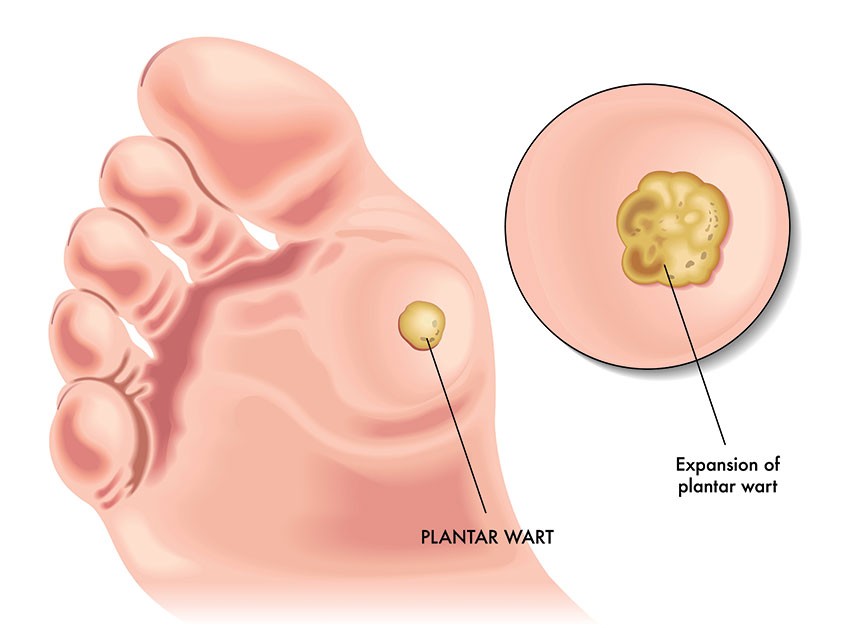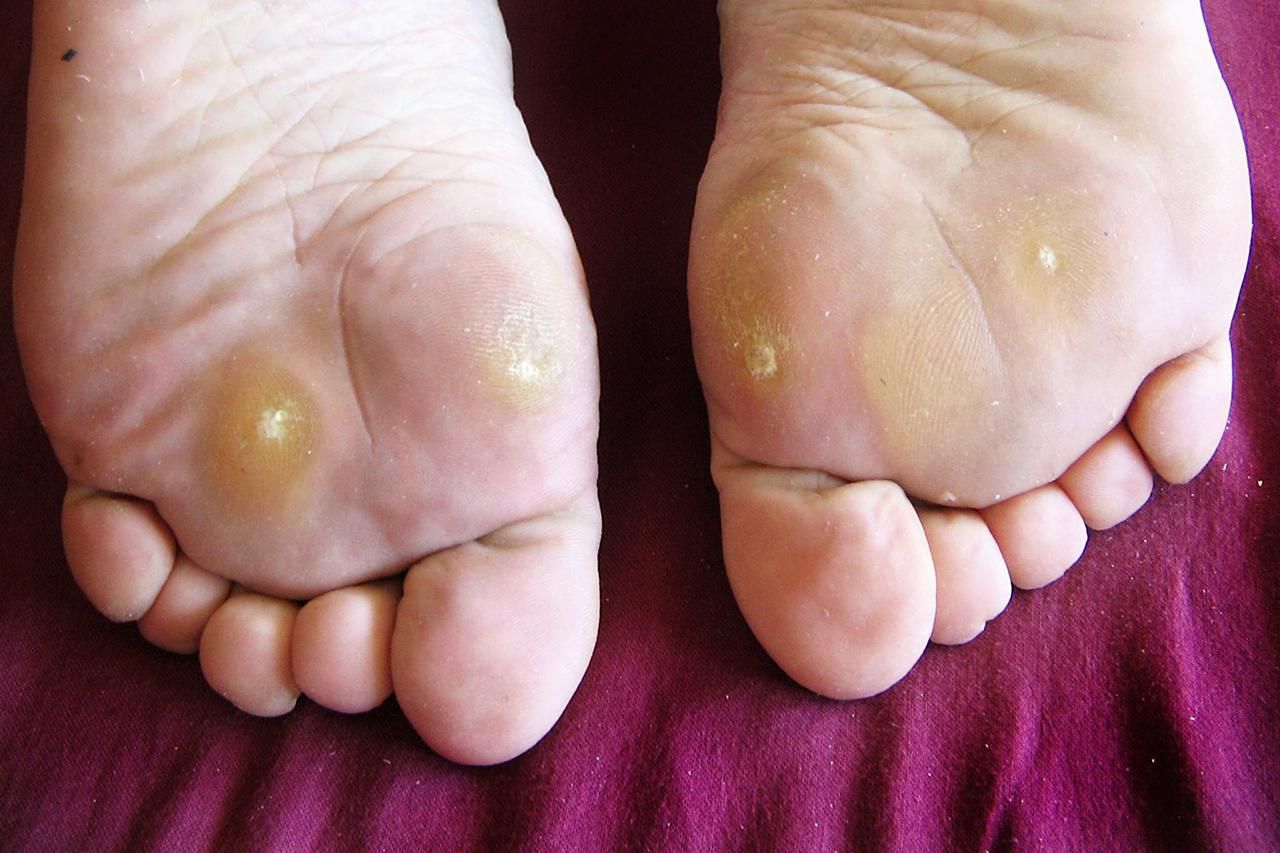Understanding Plantar Warts (Warts on Feet)
Warts on Feet? Plantar warts, resulting from the HPV virus, are frequently found on the feet, especially in weight-bearing regions or simply put: Plantar warts are small, bumpy growths that appear on the bottoms of your feet.
They often show up on the parts of your feet that bear the most weight, like the balls and heels. Sometimes, the pressure from walking can make the wart grow inward under a tough, thick layer of skin, which we call a callus.
These warts are caused by a virus called HPV. It gets into your feet through tiny cuts or breaks on the skin.
Most of the time, plantar warts are not a big health problem, especially for kids under 12. They might go away on their own without needing treatment. But if you want to remove them faster, you can try some treatments at home or visit a doctor.
Signs of Plantar Warts:
- Small, bumpy growths on the bottom of your foot, often near your toes or on the ball and heel.
- On darker skin tones like brown or black, the warts might look lighter than the surrounding skin.
- Thick, tough skin (callus) where the wart grows inward.
- Tiny black dots inside the wart, which are actually small blood vessels and are sometimes called “wart seeds.”
- A group of warts close together on your foot, known as mosaic warts.
- A wart that doesn’t follow the normal lines and patterns of your foot skin.
- Feeling pain or tenderness when you walk or stand on the wart.
When to Talk to a Doctor:
You should see a doctor if:
- The wart is bleeding, hurts a lot, or changes its appearance or color.
- You’ve tried treating the wart yourself, but it keeps coming back or spreading.
- The wart causes too much pain and affects your daily activities.
- You have diabetes or don’t feel sensations well in your feet.
- You have a weak immune system due to medications, HIV/AIDS, or other health issues.
- You’re not sure if what you have is really a wart.
It’s always a good idea to get any unusual growth or change on your skin checked out by a doctor, especially if it causes you pain or if you’re not sure what it is.
YOU MAY LIKE: Emotional Wellbeing
What Causes Plantar Warts?
Plantar warts happen when a person gets infected with a type of virus called HPV on the bottom of their feet. This virus can get in through tiny cuts or weak spots on the foot’s skin. If you don’t treat the warts, they can stick around for a few months to 2 years in kids and even longer in adults.
There are many types of HPV, over 100 in fact, but only a few can give you warts on your feet. Some other kinds of HPV can cause warts on different parts of your skin or even on wet areas like inside your mouth.
How Does the Virus Spread?
Not everyone who gets in contact with the HPV virus will get warts. People’s bodies react differently to the virus, even if they’re from the same family. The types of HPV that cause plantar warts aren’t super contagious. You usually won’t catch it from touching someone else directly.
But you might get it from warm, wet places like swimming pool areas or locker rooms. If the virus moves around, you might end up with more warts.
Who’s More Likely to Get Plantar Warts?
While anyone can get plantar warts, they’re more common in:
- Kids and teenagers
- People with weaker immune systems
- Those who’ve had plantar warts before
- People who walk barefoot in places where the wart virus hangs out, like around swimming pools or in locker rooms

What Problems Can Plantar Warts Cause?
Sometimes, plantar warts can hurt. This might change how you stand, walk, or run without you noticing. Over time, this can lead to pain in your muscles or joints.
How Can You Prevent Plantar Warts (Warts on Feet)?
Here are some tips to keep plantar warts away:
- Avoid touching warts, even your own. Always wash your hands well after touching one.
- Keep your feet clean and dry.
- Wear sandals or shoes when you’re walking in places like swimming pool areas, locker rooms, or gym showers.
- Don’t scratch or pick at warts.
- If you’re using tools like a nail clipper or pumice stone on your warts, make sure not to use them on your healthy skin or nails afterward.
SEE ALSO: Nail Problems
How Do Doctors Diagnose Plantar Warts?
Doctors usually identify plantar warts by looking at them closely. Sometimes, they might need to take a small sample (biopsy) to check for the wart virus, HPV. You’ll hear back about the results in a few days.
How Can You Treat Plantar Warts?
While some plantar warts go away on their own after 1-2 years, they can be bothersome. Here are ways to treat them:
- Freezing (Cryotherapy): A very cold substance is used to freeze and remove the wart.
- Boosting Immunity (Immunotherapy): Chemicals like diphencyprone (DCP) are used to help your body fight the wart.
- Laser Treatment: Laser light heats and removes the wart by stopping its blood supply.
- Burning (Electrocautery): An electric current is used to burn off the wart.
- Medicinal Liquid: A special liquid is applied to the wart to form a blister that later removes the wart.
- Surgery: Using tools to cut out or pull out the wart.
Can You Treat Warts at Home?
Yes! Here are some home remedies you can try:
- Duct Tape: Using duct tape can help remove the wart by wearing it for several weeks.
- Salicylic Acid: This acid helps remove thick skin layers. Use it for a few weeks to see results.
- Apple Cider Vinegar: Applying this vinegar can help remove the wart over time.
Managing Plantar Wart Symptoms
Plantar warts can be painful. To ease the pain:
- Use special shoe inserts or patches.
- Wear comfortable shoes and avoid tight or uncomfortable footwear.
- Over-the-counter pain relievers like aspirin or ibuprofen can help, but check with a doctor first.
How Can You Prevent Plantar Warts?
To lower your chances of getting plantar warts:
- Don’t touch warts.
- Wash hands and feet regularly.
- Avoid sharing personal items like towels or shoes.
- Wear clean and moisture-wicking socks.
- Clean your shoes often.
- Wear sandals in public wet areas.
- Avoid sharing tools used on warts.
What’s the Outlook for People with Plantar Warts?
Most people can get rid of plantar warts in a few weeks with treatments. But remember, once you have the wart virus (HPV), it might come back.
When Should You See a Doctor?
Contact a doctor if your wart:
- Bleeds, itches, or looks infected.
- Makes walking or standing painful.
- Changes color or grows/spreads.
Common Questions
- Plantar Wart vs. Corn: A wart is a rough bump caused by HPV, while a corn is thick skin caused by friction. Warts are contagious, but corns are not.
- Common Wart vs. Plantar Wart: Common warts are on hands and fingers, while plantar warts are on feet.
- Are Plantar Warts an STD? No, they aren’t an STD. HPV causes them, but not the types spread through skin-to-skin sexual contact.
Plantar warts can be common and sometimes uncomfortable. They can be treated easily, but always be careful to not spread them to others or different parts of your body. If you’re unsure or concerned, talk to a healthcare provider.
Plantar warts, caused by the HPV virus, are common growths on the feet, particularly on areas that bear weight. While they can be uncomfortable and sometimes painful, they are generally harmless and often disappear on their own within a couple of years as the body’s immune system fights off the virus.
However, due to their persistence, pain, or cosmetic concerns, many seek treatment options ranging from medical procedures like cryotherapy and laser treatment to home remedies like duct tape and salicylic acid.
Prevention plays a crucial role in managing and avoiding plantar warts. Simple measures such as maintaining foot hygiene, wearing protective footwear in public areas, and avoiding direct contact with warts can significantly reduce the risk of infection.
If left untreated or if there’s uncertainty about the growth, it’s always advisable to consult a healthcare professional. While treatments are available and effective, it’s essential to remember that the HPV virus can linger, potentially causing warts to reappear even after successful treatment.
Thus, awareness, prevention, and timely intervention are key to managing and living comfortably with plantar warts.

A graduate of Computer Science and Information Management Technology. Diploma – Caregiving, Certificates – Dementia and Diabetes Awareness and Management. A researcher, blogger, songwriter, singer and acoustic guitarist. Born in an environment where natural talents such as healing are imparted at our natural birth. This natural talents of healing is the result of our genetic inheritance and the training from family environment.











